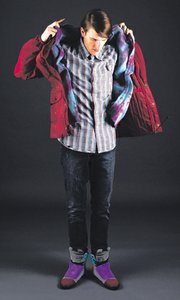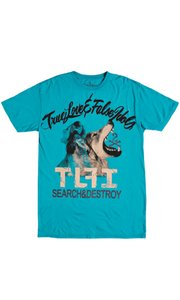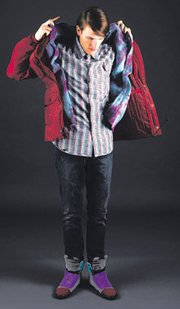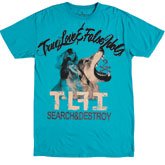Action-Sports Biggies to Grow With Small Streetwear Brands
Two big action-sports brands are hoping that success during these challenging times can be generated by flexing their extensive infrastructure muscles and growing a few independent, on-the-cusp streetwear brands that need to beef up their retail power.
That’s what Irvine, Calif.–based La Jolla Group and San Clemente, Calif.–based Four Star Distribution are doing to venture beyond their normal territory of boardsport products. Both entered into partnerships this year with small streetwear brands that have struggled to expand.
In January, Four Star, maker of the Circa family of skate apparel and footwear brands, entered into a joint venture with Copy, an upscale street-inspired sportswear brand founded in 2006 and designed by Murphy Martines.
Also in January, La Jolla—which has specialized in licensing action-sports brands such as O’Neill, Rusty, Lost and Metal Mulisha—signed a long-term licensing agreement with True Love & False Idols, a Compton, Calif.–based streetwear brand, also founded in 2006.
The goals, Four Star and La Jolla executives said, are diversification and growth. Neither Copy nor TLFI have particularly big revenue streams. Copy has been a one-man show, selling mostly T-shirts and woven shirts. TLFI has sold graphics-heavy T-shirts and hoodies in specialty stores and a handful of better department-store doors. But they both have pedigree and potential.
“We wanted to grow our brand portfolio in a way that would allow us to take advantage of our back-end operations without cannibalizing our business or competing with ourselves,” said Arely Benavides, senior vice president of Four Star. “It is a great opportunity for us to grow a small brand in an arena that is new for us.”
Toby Bost, La Jolla’s chief executive, agreed. The addition of streetwear would represent a big step in making La Jolla a “one-stop shop” for core and specialty retailers. “True Love is part of an overall diversification strategy for us. A lot of specialty stores that we sell have a floor that is segmented into separate zones, and there was a big void for us on the street side,” he said.
Streetwear has been steadily encroaching on surf/skate turf for some time. “Streetwear is already bleeding into the action-sports market. Brands such as Obey, Crooks & Castles, Rogue Status and The Hundreds are making strong headway into skate shops. It’s only natural for the big guys to swoop in,” said Aaron Levant, founder of the Agenda streetwear/surf/skate trade show.
Partnering with streetwear brands is the best way for action-sports apparel makers to join the streetwear party. “Streetwear can’t be faked,” Levant said. “A [surf/skate brand] can’t create a streetwear brand out of thin air. These kids won’t accept a faux streetwear brand.”
Levant said he has heard rumors of attempts at similar deals and wouldn’t be surprised if more partnerships are formed as the economy improves. “I think we’re going to see more of this,” he observed. “There is a market out there for streetwear—not as big as that of surf, but surf is saturated.”Full throttle
La Jolla and Four Star may not have much experience in streetwear, but that isn’t stopping them from throwing their back-end operations and merchandising smarts into the mix to quickly expand TLFI and Copy.
TLFI debuts in Spring 2011 as a full sportswear collection, including denim, jackets, knits, wovens, shorts, hats and a juniors capsule.
For Fall 2010, Copy will include a new line of footwear, outerwear, denim, accessories, knits and wovens. Spring 2011 will see the addition of technical boardshorts, a track bike shoe and a riding pant with reflective stripes and plenty of stretch for riders of fixed-gear bicycles.
The momentum is due in part to the streetwear brands’ own ambitions and in part to their newfound access and support. “Copy just needed to plug into our distribution model. Building back-office operations sometimes kills small brands, frankly,” Four Star’s Benavides said.
For their part, the principals of Copy and TLFI say sacrificing autonomy for being part of a bigger company means they have sudden access to funding and better sourcing, fabrication, sales and distribution.
Alex Erdmann, TLFI co-founder and creative director, now enjoys the perks of having a full staff supporting the brand. “The machine that La Jolla has built—the infrastructure, the back end—is pushing the brand ahead. There are teams of people dedicated to the brand at all levels.”
Recently Jim Shubin, formerly of Ezekiel and WeSC, was named head of sales and marketing for TLFI.
Copy’s Martines said that before, he was basically working from home and shipping from his garage. Now there are 12 people working on the brand.
Four Star, which in the past owned snow brands in addition to its skate brands, recruited a sales manager with streetwear experience to head up sales for Copy.
Beyond adding product categories, both brands have plans to grow their distribution and to introduce tiered pricing. “We’re going to go wider on top and bottom,” Erdmann said.
TLFI’s T-shirts range in price from $25 to $50 at retail, for example, and will most likely expand in either direction. “Eventually we may do a Copy diffusion line into different segments,” Martines said.
As Copy and TLFI settle into their new homes, they have to guard against losing the authenticity and identity that give them street credibility.
“Streetwear goes against the grain. It doesn’t have a corporate mindset,” said Ryan Rush, vice president of design at La Jolla, a streetwear veteran and the executive tasked with orchestrating TLFI’s success. “Streetwear is about passion and having a point of difference. A $100 million company is very different; it doesn’t deviate from its successes. My job is to package a streetwear vision into a formula that will be successful in this environment, to distill it into something that we can turn into commerce. That’s exciting for me.”

























